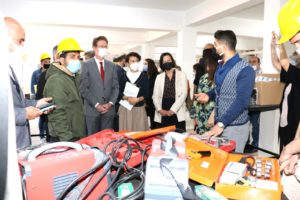
Strengthening the Internal Market
Project is comprised of six components, as follows: Component 1: Improving the strategic, legislative and institutional framework in area of Free Movement of Goods Component 2: Improving the strategic, legislative and institutional framework in area of Free Movement of Services. Component 3: Improving the legislative alignment with the

Increasing Attractiveness, Inclusiveness and Relevance of VET and Adult Education
The overall objective is to improve skill matches of youth and adults in line with labour market needs by increasing access to quality vocational education, training and adult education. The project supports the Ministry of Education and Science of the Republic of Nort Macedonia and related national educational

Increasing Competitiveness of Middle Black Sea Region TR83
Turkey’s Middle Black Sea region was set up in 2009 and is now well established; the Middle Black Sea Region Development Agency (OKA) carries out activities to support the economic and social development of Amasya, Çorum, Samsun and Tokat provinces. The main objective of this project was to

Technical Assistance for Promoting Youth Employment in TRC3 Region
The purpose of the contract is to increase the vocational skills of young people in TRC3 Region and promote their integration into the labour market through conducting vocational and entrepreneurship training, guidance and counselling services. Also, it applies a holistic approach to increase the capacity of multiple stakeholders

Technical Assistance for Garment Training and Entrepreneurship Initiative (GATE for Women)
Women’s inequality in the labour sector has been an unsolved problem for generations. However, if women find the right support at the right time, it provides excellent results. Likewise, the overall aim of this project was to increase women’s employability and support women’s entrepreneurship by strengthening women’s vocational

Strengthening Vocational Qualifications Authority (VQA) and National Qualifications System (NQS) in Turkey
It can be claimed that the labour markets are required to ensure the provision of formal and non-formal education and training, to support life-long learning, strengthening the relationship between education and employment, and facilitating harmonization with the European Qualifications Framework (EQF). Within this scope, the project aimed to

